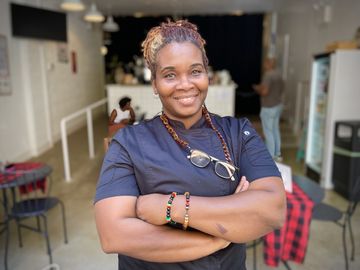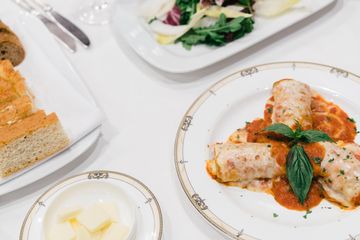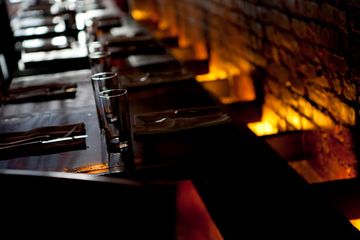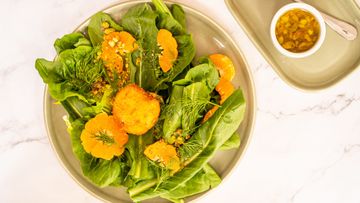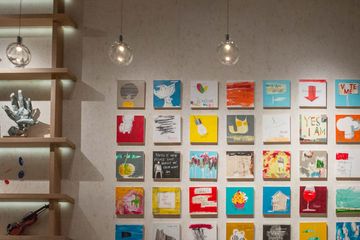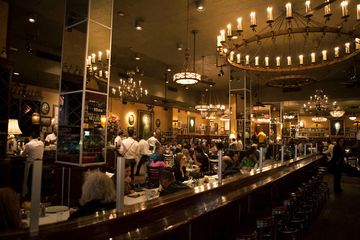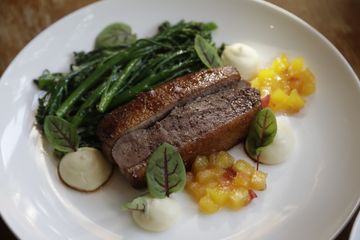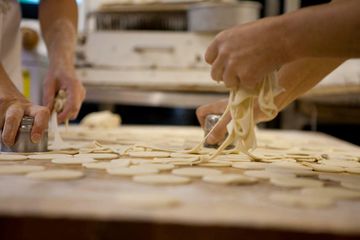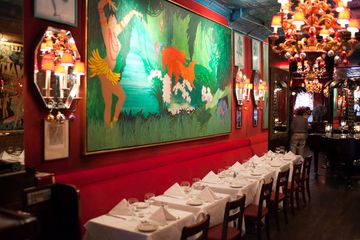It's her first venture in Manhattan and she's had to pick up some new skills along the way too, but hospitality veteran Nicola Campbell is feeling right at home in Hell's Kitchen as she opens brand-new Jamaican eatery Cafe 424 on W54th Street between 9th and 10th Avenue. Currently in soft-launch mode and open from Wednesday to Saturday 10am to 7pm, the team at Cafe 424 are planning a grand opening September 15 to 17, after which they will operate from 8am to 10pm Wednesday through Saturday, serving Jamaican-themed pastries, coffee, lunch and dinner. Nicola, known as “Chef Mom” grew up in Willowdene Estates in the parish of St Catherine, Jamaica, where she learned to cook alongside her grandmother. “I used to be in the kitchen with my grandma all the time, ” said Nicola. “Back then I didn’t love it — it felt like punishment, but as I got older I realized that I had natural talent. ”She moved to New York City in 1999, opening several Caribbean restaurants in Queens and earning a degree from the prestigious Institute of Culinary Education. “I started using the skill sets that I got from my grandmother, ” said Nicola. “I decided to go to culinary school to sharpen those skills, and the rest is history. ” Her professional nickname “came from culinary school and when I was graduated — my kids said, ‘What should we call you now? ’” All of her children have helped with the business through the years, including daughter Zhana Clacken, who works as her partner and technology expert at Cafe 424. After closing one restaurant in Long Island City due to damage from Hurricane Sandy and selling another establishment in Jamaica, Queens in 2016, “I swore that I would never do this again, ” said Nicola. But when she got the chance to collaborate with non-profit co-op Prime Produce, an organization dedicated to supporting entrepreneurs and artists with their multi-use space on W54th Street, Nicola decided to take the leap. “I met these fabulous people from Prime Produce who want to do good in the world, ” said Nicola. “Why wouldn’t I want to be a part of it? ”After signing on as the organization’s in-house concession provider and operator of the public-facing café, the next challenge for Nicola was to build the kind of environment that she hoped would attract regular neighborhood patrons. “We wanted to create a homey, relaxed vibe, ” she said. “We want you to stay — we offer free WiFi so that you can come on down and chill with us. ”Used to commercial kitchens, she was happy to find a convection oven to fit the smaller space, allowing her to develop a full menu of breakfast, lunch and dinner options cooked onsite. “I'm used to a full kitchen, ” said Nicola. “But from experience working in colleges and hotels, restaurants and catering, I've had to pull all those things together. ”Nicola and her team are happy to be able to offer freshly-baked, in-house seasonal pastries, including treats like apple pies, bread pudding and, come holiday time, a rum raisin fruit cake featuring raisins that Nicola has been lovingly tending to and soaking for five years. For lunch and dinner, she’s developed a small, constantly rotating seasonal menu with Jamaican classics like jerk chicken, oxtails, curry goat, seafood and jerk fried rice. Everything is cooked to order and they offer vegan options in their lunch, dinner and dessert menus. The process has allowed Nicola to experiment with Jamaican fusion cuisine, she added. “I try to mix up my Jamaican side and my culinary-training side and bring a little bit of French and a little bit of Italian-style to different dishes — oxtail cooked French-style and combinations like that. ” But when it came to creating the café’s beverage program, Nicola had a lot to learn. “I was challenged because I've never actually done a coffee shop before, ” she said. She got to work researching the coffee brewing process, and landed on using premium Jamaican Blue Mountain Coffee for the café’s offerings. “I wanted specifically to stay true to my heritage, and Jamaican Blue Mountain Coffee is what I was raised on — growing up back home in Jamaica with my grandmother, that's all we used to have, ” she said. “I wanted to go back to that tradition, so I went to a company called Jamrock Coffee to work with them and try different roasts. We’re offering dark roast because that's where the flavors were the most intense. ” Working with head barista Dovi Akouete, Nicola trained herself on the art of brewing, and proudly declares that while “it used to just be coffee to me, I learned so much about the beans and the roasting process and making these drinks that now I really know the difference between a Macchiato and a Cappuccino. ”Nicola is so well-versed that she’s proud to offer fully-customizable drinks (and dishes) based on a customer’s needs. “If you’re hungry or thirsty for something, we’ll make you a drink or dish especially for you, ” she added. “We don’t want to be cookie-cutter and we consider ourselves a boutique, niche café. ” Keeping in the spirit of experimentation, Nicola hopes to implement a private chef’s table tasting menu every Sunday starting in October, featuring a four-course, prix fixe menu perfect for group gatherings and special events. Nicola is excited for the road ahead, and bolstered by the amount of community support already shown to the café. “People are super excited we’re here, ” she said, just as several Hell’s Kitchen residents walked by and shouted “We can’t wait to come by! Welcome! ”. Reception from the local business community has also been warm, added Nicola — they’ve already connected with the owners of Jaz Indian Cuisine and Mamasita. “It’s on our list to circle all of the nearby businesses, ” she added. “It’s all about unity — we can’t do this alone, and that’s our model with Prime Produce too. We are a strong team, not just as a café, but as a community and a co-op. It’s all about team members. ” For now, Chef Mom is focusing on the lead up to their official opening weekend, and taking in the joyful, fast-paced energy of all it entails. “It’s a lovely space, with great people and a great mission, ” she said. “I’ve never operated in Manhattan, and this is a lovely neighborhood, so I was open to taking on the challenge, and as they would say, ‘jumping off the cliff! ’” This story originally appeared on W42ST. nyc as "Enjoy a Flavor of Jamaican Cuisine and Hospitality as Cafe 424 Opens in Hell's Kitchen" in August 2022.
